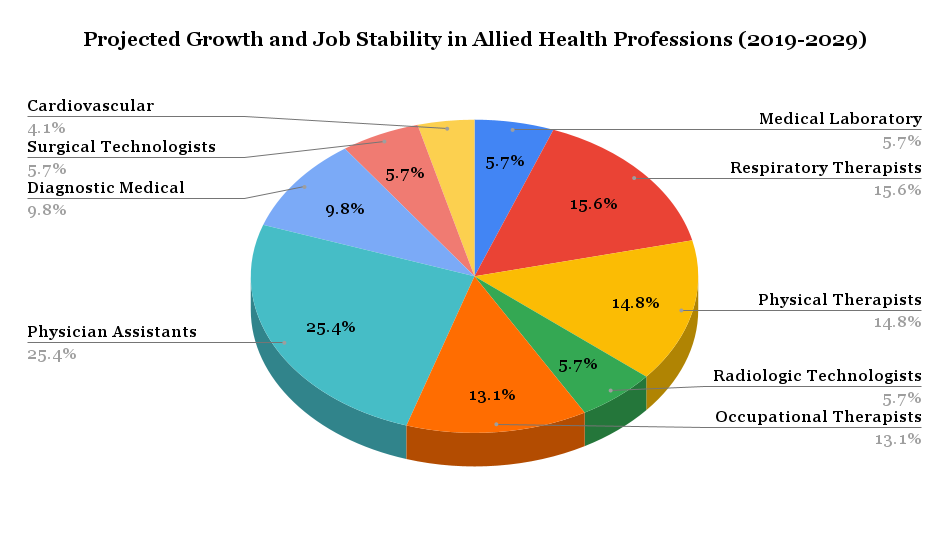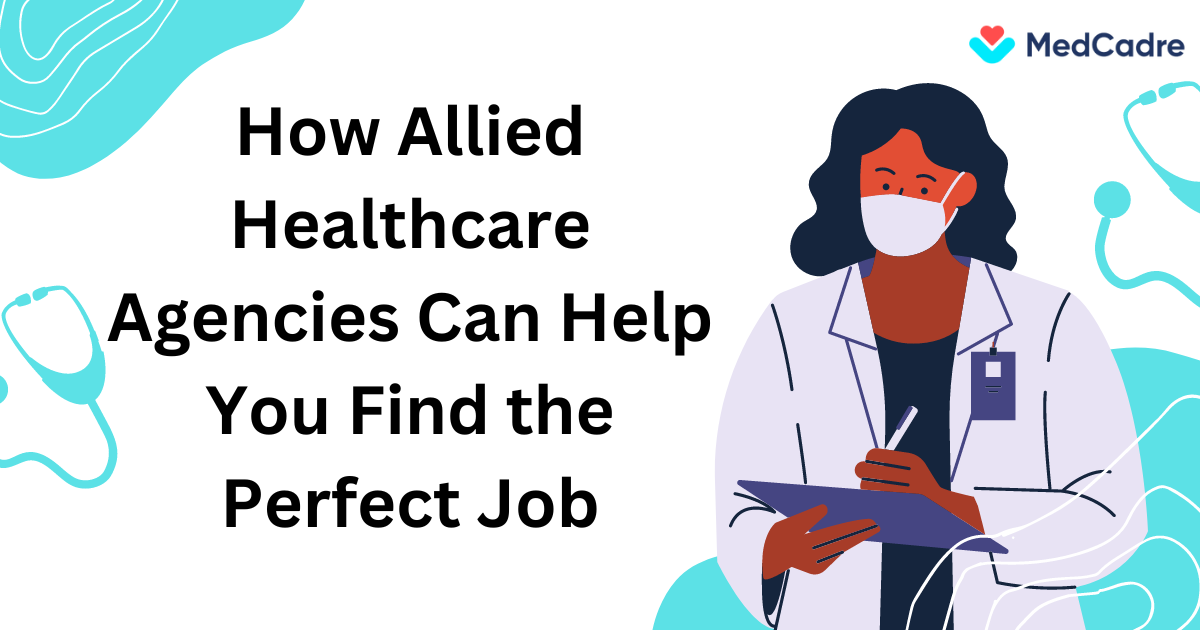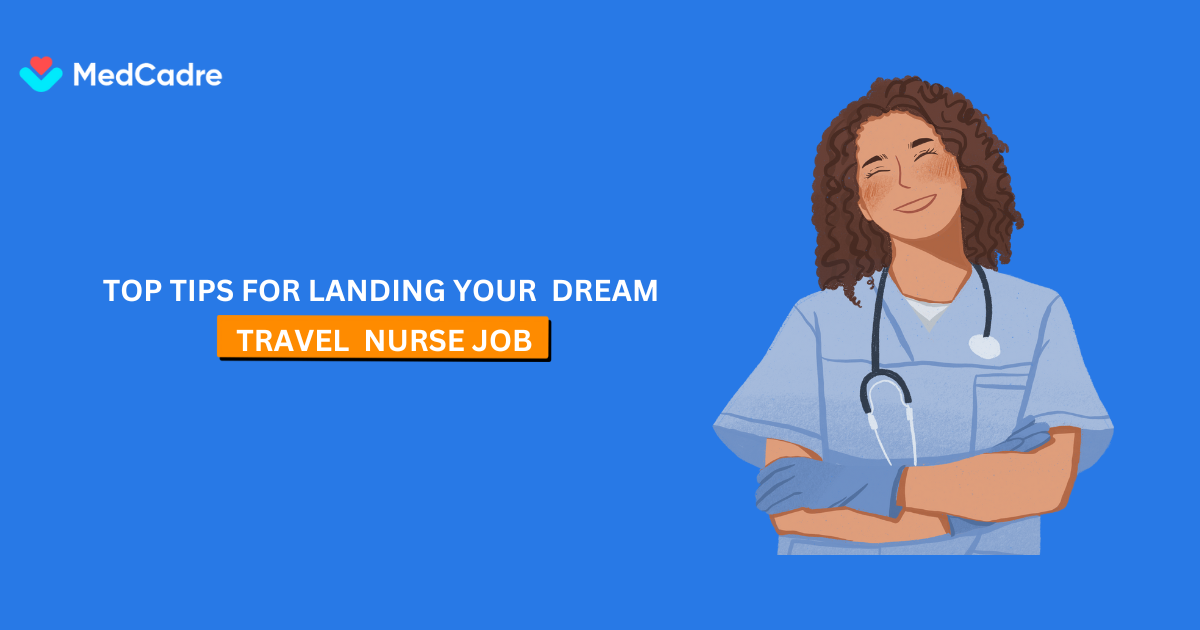Allied Health Professions is an essential part of the healthcare industry, they play a crucial role in supporting doctors, nurses, and other healthcare experts. Career in Allied Health Professions cover a wide range of jobs, from running medical tests to helping people with physical therapy.
In recent times, these roles have become more important as they contribute significantly to the overall health of individuals. but are you aware of the advantages they have? If not so, today in this article, we’ll explore why pursuing a career in allied health professions can be a great choice.
Advantages of Allied Health Jobs
1. Diverse career opportunities
One of the most compelling aspects of Allied Health Career Benefits of the career paths available. From medical laboratory technologists and respiratory therapists to physical therapists and radiologic technologists, there’s a wide range of specialties to explore. This diversity allows individuals to find a niche that aligns with their interests, skills, and passions.
2. Shorter education and training
Unlike the extensive schooling required to become a physician, many allied health professions offer shorter educational pathways. While the exact requirements vary depending on the specialty, many programs can be completed in two to four years. This means that aspiring allied health professionals can enter the workforce sooner, potentially earning a steady income while their peers pursuing more traditional medical careers are still in school.
3. Job stability and future growth
The healthcare industry is renowned for its stability, and allied health professions are no exception. With an aging population and advancements in medical technology driving increased demand for healthcare services, job prospects for allied health professionals remain strong. According to the Bureau of Labor Statistics, employment in healthcare occupations is projected to grow 15% from 2019 to 2029, and the Allied Health Career Benefits much faster than the average for all occupations.

If you are looking for related to Allied Healthcare
4. Rewarding work
Allied health professionals directly impact patient care and outcomes, often forming close relationships with those they serve. Whether it’s helping a patient regain mobility after an injury, conducting diagnostic tests to detect illnesses, or providing treatments to improve quality of life, the Career in Allied Health Professions is immensely rewarding. Knowing that you’re making a tangible difference in the lives of others can be incredibly fulfilling.
5. Opportunities for advancement
Advantages of Allied Health Jobs offer numerous opportunities for career advancement and of professional development. With experience and additional education, individuals can pursue advanced practice roles, management positions, teaching positions, or even transition into healthcare administration or research. The ability to continuously learn and grow within the field ensures that Allied Health Career Benefits can carve out fulfilling and meaningful careers over the long term.
6. Work-life balance
While healthcare can be demanding, many Career in Allied Health Professions offer more predictable schedules and better work-life balance compared to some other healthcare roles. Depending on the setting and specialty, allied health professionals may have more control over their hours, allowing them to balance their professional responsibilities with personal pursuits and family life.
7. Contribution to interdisciplinary teams
Healthcare delivery is increasingly becoming a collaborative effort, with interdisciplinary teams working together to provide comprehensive care to patients. Advantages of Allied Health Jobs play integral roles within these teams, bringing their unique expertise and perspectives to the table. Collaborating with physicians, nurses, social workers, and other healthcare professionals not only enhances patient care but also fosters a sense of camaraderie and mutual respect among team members.
Education and certification requirements
| Allied Health Profession | Education requirements | Certification requirements |
| Physical Therapist | A Doctor of Physical Therapy (DPT) from an accredited program. | Successful completion of the National Physical Therapy Exam (NPTE) for licensure. |
| Occupational Therapist | Master’s or Doctoral degree in Occupational Therapy from an accredited program. | Passing the national certification exam administered by the National Board for Certification in Occupational Therapy (NBCOT). |
| Radiologic Technologist | Associate degree (or bachelor’s degree) in radiologic technology. | Certification through the American Registry of Radiologic Technologists (ARRT) or a similar certifying body, depending on the state. |
| Respiratory Therapist | Associate degree in respiratory therapy (or bachelor’s degree). | Passing the National Board for Respiratory Care (NBRC) examination for licensure. |
| Speech-Language Pathologist | Master’s degree in Speech-Language Pathology. | State licensure and optional certification through the American Speech-Language-Hearing Association (ASHA). |
| Medical Laboratory Technologist | Bachelor’s degree in medical technology or related field. | Certification through organizations like the American Society for Clinical Pathology (ASCP). |
Challenges in Allied Health Professions
Along with the Advantages of Allied Health Jobs they face some challenges also, and they contribute to patient care and well-being. However, like any sector, these professions face several challenges that impact both professionals and the quality of healthcare services.
Here are some of the key challenges in Allied Health Career Opportunities:
1. Workforce shortages
One of the most pressing challenges in Allied Health is the shortage of qualified professionals. The demand for healthcare services is consistently high, but shortages in specific professions, such as physical therapy or respiratory therapy, can lead to increased workloads and potentially compromise patient care.
2. Educational barriers
The educational requirements for many Allied Health Career Opportunities can be demanding. Lengthy and rigorous programs, coupled with the need for clinical experience, can deter individuals from pursuing these careers. Additionally, limited access to educational programs in certain regions exacerbates workforce shortages.
3. Lack of recognition
Allied Health Career Opportunities often struggle with a lack of visibility and recognition compared to other healthcare roles like physicians and nurses. This lack of recognition can lead to lower job satisfaction, reduced opportunities for career advancement, and challenges in advocating for fair compensation.
4. Inter professional collaboration
While collaboration is essential in healthcare, establishing effective inter professional collaboration can be challenging. Allied Health Professionals may face barriers in communication and teamwork with physicians and nurses, impacting the seamless delivery of patient care.
5. Burnout and stress
Allied Health Professionals, like many healthcare workers, may experience high levels of stress and burnout. Heavy workloads, demanding schedules, and emotional challenges associated with patient care can contribute to mental health issues and job dissatisfaction.
6. Technological advancements
While technology can enhance patient care, staying updated with rapidly evolving technologies poses a challenge. Allied Health Professionals need continuous training to adapt to new equipment and techniques, and healthcare institutions may face financial constraints in keeping up with technological advancements.
7. Regulatory changes
The healthcare industry is subject to frequent regulatory changes, affecting the practice of Allied Health Professionals. Adapting to new regulations, licensing requirements, and compliance standards can be time-consuming and add administrative burdens.
8. Patient diversity and cultural competence
The diverse patient population served by Allied Health Professionals requires cultural competence. Understanding and addressing the unique needs and perspectives of patients from various backgrounds can be challenging, and insufficient cultural competence may affect the quality of care provided.
9. Financial pressures
Allied Health Professionals, particularly in outpatient settings, may face financial pressures due to changes in reimbursement policies and insurance coverage. These financial constraints can limit resources for professional development and may affect job satisfaction.
10. Public awareness and advocacy
Limited public awareness of the roles and contributions of Allied Health Career Opportunities can hinder advocacy efforts for necessary resources, professional recognition, and policy changes that benefit the entire workforce.
Conclusion
A career in allied health professions offers numerous advantages, from diverse career opportunities and shorter education pathways to job stability, rewarding work, and opportunities for advancement. For individuals passionate about healthcare and committed to making a difference in the lives of others, Allied Health Career Benefits provide a fulfilling and meaningful career path worth exploring.
If you are looking for a job in the allied health profession job- MedCadre will be the right choice, our team of recruiters thoroughly checks your profile and gives you a call as per your skills, profile, and experience.
What do you need to do? You just need to drop us your CV through the “submit your CV” or through the career page “Apply Now” button. Once we will receive your resume our team will directly connect you through call and email.





